Blues Reviews
Feb/March 2022
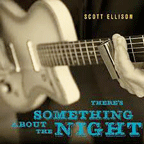 Scott Ellison
Scott Ellison
There’s Something About the Night
Swordfish Records/Liberation Hall
Scott Ellison is an artist that aims to please. Not only is he a consummate vocal stylist and guitar player, but, along with primary writing partner Michael Price, has crafted a collection of essential and memorable straight-ahead blues and R&B material. Ellison is like a chameleon in the way he is able to embody different vocal inflections and moods and give the listener a true musically immersive experience. He’s got a great cast of classic session musicians on this project. And giving humble credit to his extensive team behind the scenes only adds to his authenticity and appeal.
This is an action-packed collection of story songs and extended jams, beginning with the rough and tumble shuffle of “Half a Bottle Down.” This draws you into the album, with a, somewhat self-deprecating look at choosing the bottle over a relationship. Ellison barks, “I don’t smoke no weed, I don’t do no crack, I’m a half a bottle down, just me and Jack.” There’s a nice convergence of multi-tracked lead guitars that Ellison weaves in towards the end. The title track has a palpable “Harlem Nocturne”-like noir feel to it. Ellison sings, with a Tom Waits-inspired rasp over T-Bone Walker/Buddy Guy-influenced guitars. One of the strongest tracks here is a tasty cover of Bobby Bland’s “Ain’t No Love in the Heart of the City.” The lyrics were actually written in 1974 by Price and Ellison delivers it with all the passion and pathos of the original. The groove is solid and Jon Greathouse’s Hammond B3 work is sublime. “Bury Your Bone at Home” picks up the pace and swings like crazy. Again, Greathouse’s keyboard skills are at the forefront, with some jazzy picking from the leader. “Blowin’ Like a Hurricane” has a slightly different production feel. It is very raw and straight ahead, with Chris Campbell on lead vocals. Ellison concentrates here on slide work and nails it. “Salina” brings in some New Orleans’ spice to the mix. It has kind of a Eric Clapton/J.J. Cale country blues feel, with accordion by Scott McQuade. “Meat and Potatoes” is a simple mid-tempo blues rocker. Ellison’s ripping slide work and David Bernston’s harmonica prowess truly defines the track. “Feast or Famine” is a no frills funky soul cooker. Uncredited horns and stellar harmonies from the Waters’ Sisters and Ginger Blake make this one a highlight. Between the virus and being overdue on the rent Ellison sings about 2020 being a “Good Year for the Blues.” It’s a standard ballad-like tune, with clever lyrics and crunchy guitars. The leader taps into his inner Carl Perkins for the boogie rocker “I’m Ready Baby.” Hank Charles’ piano adds a nice touch. Their love of Tex-Mex food and makeup sex are what Ellison and his woman have in common in the song “Mirror Image.” It’s a catchy shuffle that really locks in, with Ron McRorey on drums. “Chains of Love” harkens back, stylistically, to late ’70s-era Clapton. Marcy Levy even chimes in on background vocals. “Revolutionary Man” is Ellison’s tribute to the blues masters like Muddy Waters, Howling Wolf and others. It’s a down and dirty shuffle, with a take-no-prisoners groove. The album concludes, with a song about suspicious minds and cheating called “Where Do You Go When You Leave?” Funky and deep Memphis roots come to mind here. It features some of Ellison’s most soulful vocals and fine guitar exchanges from the great Albert Lee.—Eric Harabadian
 Val Starr and the Blues Rocket
Val Starr and the Blues Rocket
Healing Kind
of Blues
Sandwich Factory Records
Val Starr is a singer-songwriter and guitarist who has returned with her sixth solo album of all original blues tunes. Her California-flavored and uplifting style blends all areas of the blues genre in one big melting pot. She’s got a sweet and clean vocal approach that really cuts through and connects with the listener. All the tunes on this particular release primarily center on challenges, advantages and humor that revolve around aging. Starr’s philosophy is one that embraces positivity and hope for the future.
The Blues Rocket band features bassist John Ellis, lead guitarist Tim Brisson, drummer Paul Farman and harpist Frankie Munz. There is a polish and sophistication to their sound that comes from years of performing together. The dozen tracks here all flow pretty well, beginning with the upbeat “Ridin’ That Memphis High.” It’s, of course, all about the Memphis music scene where Starr sings, “Ground zero where much of it began. It doesn’t matter if you play or if you’re a fan.” “All About the Shuffle” follows and swings hard, with a tasty piano and guitar exchange. It’s a catchy dance track. “Slow Blues Grinder” takes the tempo down a notch, but really highlights Brisson’s leads throughout. The title track “Healing Kind of Blues” is what Starr’s all about. It’s a relaxed jazzy piece where guest tenor saxophonist Danny Sandoval complements the leader’s message: “I close my eyes and visualize the healing kind of blues.” Starr plays a style designed to free your mind, if you let it. “If You Ever Change Your Mind” possesses an oldies feel where Starr sounds uncannily like Patsy Cline. Again, this cut swings and gives free reign for Sandoval to take some liberties on his horn. “Age is Just a Number” hits home for a lot of folks. But Starr says not to get hung up about it! The harmonies here are really nice and Munz’s harmonica riffs come through loud and clear. “Pretty Girl Blues” and “Don’t Love “Em” are back-to-back female self empowerment songs that anyone can relate to. Starr continues to spread the love and wants to bring her audience along for the ride. That brings us to a hot single and radio-ready track called “Outside Looking In.” It’s a real rocker that features some outstanding leads from Brisson. Here Starr sides with the disenfranchised, but assures there is a purpose to our existence and “life is not a random game of chance.” “We’re Not Getting Older” is not only a lean-and-mean shuffle, but pretty straight-ahead good advice. “Blues Family” follows and is rather unique here for guest violinist Ilana Katz Katz’s bluegrass-like licks over a soft calypso beat. But, despite all the challenges and whatnot life throws at you, the redheaded blues rocker says “Get Over It.” Essentially her message here is a classic one; don’t sweat the small stuff! Guest Todd Morgan’s boogie piano and a rocking groove set0 the mood for Starr’s insightful lyrics, “You finally reached the age where you’re comfy in your skin, even though you’re not the same. You look into the mirror, is that person really you? Well, I’m here to say you need to stay away from feeling blue.”
With all the pervasive insanity and unrest going on right now, perhaps Starr’s sunny messaging, with a little shot of blues, is the additional “booster” we all need!—Eric Harabadian
 Rare Union
Rare Union
Brother of Mine
www.rareunionband.com
As their website alludes, Rare Union is a trio borne out of the chaos and lockdown of the pandemic. Lead vocalist-guitarist Max Soler, guitarist Martin Cage and percussionist L.A. Smith are the leading movers and shakers of this outfit. The music is conga and percussion-fueled rock, with a heavy helping of bluesy guitar and soulful vocals. Santana and WAR may quickly come to mind, but there are also flourishes of CSN&Y, Little Feat and, even Southern Rock as well.
The dozen original tracks here open with the poppy and tuneful “Main Line.” It features a catchy and resonant chorus where Soler’s vocals soar above urgent funky chords. Cage’s smooth lead lines and Smith’s pervasive beats set things off on a breezy tropical note. “Bring it On” keeps the groove flowing, with a slightly darker vibe. The harmonies give this some density and spirit. The cyclical, arpeggiated rhythms of “Won’t Be Lost” take this to new heights. And that paves the way for a slight shift in mood and focus, with the ballad “Gone Away.” The acoustic-oriented tune gives a lot of space for Soler to really display his storytelling skills. He does so effectively here. “Give You All” stays in a pop kind of vein where syncopated rhythms and strong harmonies define this earnest love song. “Far Away” is another track that can simply be categorized as melodic and catchy. Cage’s indelible hooks lock in, with Soler’s wordless vocalizing for something truly unique and unusual. “Tale of a Good Man” sounds like it was taken straight from a collective diary and seems to speak truth to power. Musically there is a lot going on, with a convergence of a waltz time figure, bluesy leads and rich orchestration from cellist Michael Kott. “Studio Man” sounds like another page from the band diary. Anyone that is, or has ever been, in some type of musical or recording entity can relate. That’s followed by a straight up rocker called “Freedom Town.” Probably the purest “blues” song here is one called “Hold On.” It basically is built off of a I-IV-V structure, but takes some unexpected twists and turns in the chorus. “Ain’t Going Down” lays it on the line as Cage rips on some crunchy mid-tempo riffs. It’s a wall of sound aided by Soler’s ferocious vocals. They wrap it up with the title track “Brother of Mine.” It is respectfully dedicated to a fallen friend where Soler sings, “His spirit was free. He showed us what a good man can be.” The tune’s hard rock and country feel seems to typify the album’s overall mood and purpose.
In addition to the trio of Smith, Soler and Cage, various tracks would not be complete without the contributions of drummers Danny Carroll, Jimmy Pollard and Jerry Russo, along with Will Reeves on bass. Rare Union is a band that, while perhaps not overtly “blues,” certainly wears that badge of honor in their heart and on their sleeve.—Eric Harabadian
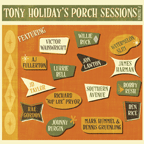 Tony Holiday and Various Artists
Tony Holiday and Various Artists
Tony Holiday’s Porch Sessions: Volume 2
Blue Heart Records
Tony Holiday’s Porch Sessions: Volume 2 follows the first installment released in 2019. Holiday, a Memphis-based blues harmonica player extraordinaire, went around the country, along with engineer JD Taylor, to record many great blues artists literally right on their front porch. The results are astounding. The sound is of high quality and the performances are all top shelf. Eschewing the sterile confines of the typical recording studio and the challenges of recording at a live date, Holiday succeeds in creating a relaxed atmosphere resulting in a thoroughly entertaining listening experience. Many of today’s top contemporary blues artists participate, including Bobby Rush, Victor Wainwright, Kim Wilson, Kid Andersen and Watermelon Slim, along with Johnny Burgin and Kid Ramos, who both appeared on the original Porch Sessions. Many of the arrangements are stripped down “front porch” affairs, single guitar (electric or acoustic) and harmonica. Tracks like Jon Lawton’s “Go,” Lurrie Bell’s “Every Day I Have the Blues,” JD Taylor’s “Family Tree” and the poignant original “Change is Inevitable” by AJ Fullerton. But there’s also some full band performances, like the Muddy Waters’ standard “Honey Bee” by Willie Buck, featuring Fabulous Thunderbirds’ front man Kim Wilson on harp and the opening track by Victor Wainwright, the Thunderbirds cover “She’s Tuff.” The solo performance by Watermelon Slim of Howlin’ Wolf’s “Smokestack Lightning” is a highlight, as well as Bobby Rush’s take on “Recipe For Love,” backed only by Vasti Jackson’s superb electric guitar. The album is dedicated to the late James Harman, who sadly passed away after recording “Going to Court 2.” And last but not least, much credit should go to Tony Holiday, who appears on only a handful of tracks, but whose impeccable harmonica chops drive each song he plays on. Here’s looking forward to Volume 3! — Bob Monteleone
 Anthony Wild
Anthony Wild
Gonna Have to Call a Tow-Truck…
Wild Publishing & Recording
Anthony Wild is a good dude, make that a very good dude. He is the founder of “Kids Rock the Nation,” a non-profit that, since 2014, has donated over 1500 instruments to schools and kids, with the only requirement simply being the student’s will to learn. Anthony Wild is also very much a blues artist. Based in Florida, he has graced the stages of many clubs and festivals for years. Wild’s recent release, Gonna Have to Call a Tow-Truck, was produced by Grammy-nominated and three-time Blues Music Awards winner Kenny Neal. Recorded at Neal’s Brookstown Recording Studio in Baton Rouge, Gonna Have to Call a Tow-Truc is a family affair. Neal’s brothers, Darnell and Graylin (bass and drums), are the rhythm section on the session, and a third sibling, Fredrick, contributes piano to the proceedings. Billy Baltera handles guitars along with Kenny Neal, Leroy Bishop Toussaint plays Hammond B3 organ along with Gerard Guida (on the track “Need to Know Basis”) and Steven Karmpa and producer Neal play harmonica. But the focus of these eleven songs is squarely on the vocal styling and personality of Mr. Wild. Wild sings throughout the album in that lived in, throaty sound similar to Howlin’ Wolf or ZZ Top’s Billy Gibbons. He especially might remind one of Reverend Billy on a down and dirty shuffle like “Mississippi Mud.” The album kicks off with the easygoing, harp-driven “Tricky To Me,” where Wild muses that “This thing they call love is tricky to me.” The minor key blues “Slip’n Down” follows, featuring some tasty, overdriven guitar tones from Kenny Neal throughout. “Need To Know Basis” explores a lover’s frustration with their partner’s explanation for some assumed infidelities. “Tow Truck” is a Chicago-styled number that describes a man’s frustration with his woman who “got liquored up crazy” and “crashed my car, it’s in the ditch tonight. Gonna have to call a tow-truck.” “Hold On to Your Love’n” is a catchy, bouncy number with some Duane Allman-influenced slide guitar. “Sweet Potato” is a nice change of pace, resting the band and taking a “front porch” approach, with just guitar and harmonica accompaniment. All in all, a solid outing for Mr. Wild. —Bob Monteleone
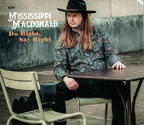 Mississippi MacDonald
Mississippi MacDonald
Do Right, Say Right”
Another Planet Music 2021
He’s not from Mississippi, although he has visited, and he wasn’t originally a bluesman. Nonetheless, like some other under-recognized contemporary blues performers from the British Isles - Davy Knowles, Dani Wilde, Wily Bo Walker are a few - Oliver MacDonald is worthy of attention.
Based in London, MacDonald began to play guitar at age eleven in 1991 after seeing seminal U.S. rocker Chuck Berry perform. Within a few years he was playing gigs, reflecting some of his other main influences, like soul legend Al Green and pop icon Roy Orbison. Eventually he became an inveterate bluesman, garnering three British Blues Award nominations. His sixth album finds him fronting drummer Mark Johnson, bassist Elliot Boughen, backing singer Lucy Dearing, and guitarist, keyboardist, and producer Phil Dearing as they dig into eight MacDonald originals and a cover of a humorous Denise LaSalle tune.
MacDonald’s primary mode of guitar renderings is an animated cascade of unhurried, stinging single notes. He eschews both chords and rapid runs of flashy technical display. Instead, his solos may evoke memories of the styles of both Albert King (albeit with fewer bent notes) and Son Seals. His approach serves him well on both uptempo numbers and slow blues. An example of the latter is “Let Me Explore Your Mind,” the longest track at over six minutes, with MacDonald here sounding more like B.B. King than Albert. His slightly raspy baritone vocal complements the song’s ambience, and Phil Dearing delivers fine organ support, as he does throughout. A horn section contributes tastefully (although no horn players are listed in the album credits).
An example of a compelling upbeat track is “I Heard It Twice,” Dearing this time abetting first on piano and then organ as MacDonald sings “I don’t like your blues/I heard it twice the first time.” “Drinker’s Blues,” another slow track, introduces Lucy Dearing’s soulful vocalizing. “If You Want a Good Cup of Coffee” name-drops Bobby Rush as Miss. Mac. and Phil engage in some of their best guitar-organ interplay, and “Keep Your Hand Out of My Pocket” opens with a beautiful fifty second guitar solo.
The album finishes with its only cover, LaSalle’s “Your Wife Is Cheating on Us” (lyrics previously modified for heterosexual gender credibility by Little Milton Campbell). The mid-tempo shuffle, with more fine horn accompaniment, serves as a nice conclusion to an accomplished outing of British blues.—Steve Daniels
 Hanna PK
Hanna PK
Blues All Over My Shoes
Booga Music/VizzTone 2021
Add Hanna PK to the list of young pianist/singer/songwriters - think also Veronica Lewis and Ben Levin - who have entered the blues realm impressively in the last couple of years.
Born in South Korea, Hanna resides in Rochester, New York, where she became enamored of the blues and over five years ago formed her own band. She and a guitarist colleague reached the semi-finals of the 2019 International Blues Challenge. “Blues All Over My Shoes” is her third album, and it is produced by Booga Music impresario and blues luminary Kenny Neal, who also plays guitar, bass, and harmonica on it.
Hanna cites among her main piano influences Big Maceo Merriweather, Nina Simone, Otis Spann, Aretha Franklin, and Memphis Slim. The only cover tune of the eleven tracks comprising this set is a Memphis Slim number, “I’m Lost Without You.” “Little Mike” Harris on drums and Miguel Hernandez on bass skillfully provide backing (here and throughout the set) as Hanna dishes out a zesty version of the tune, displaying the steady left hand and supple right hand that confirm her prowess at the keys. The same energy is manifest on “Bad Woman,” a shuffle with some of her most delightful ivory tinkling.
Kenny Neal lends his guitar artistry to “Insomnia Blues,” a slow outing, and “It’s Alright Baby,” another shuffle but with some creative, idiosyncratic syncopation. Neal also supplies the harmonica introduction and tasty fills on “Mirror Mirror.”
In general, the set alternates between upbeat and languorous numbers; especially pleasing are the successive one-two punch of “Ain’t Gonna Be Looking Back No More” and “It’s Been Raining in My Heart.” The album concludes with “Two and Four,” a rousing cut with Hanna ranging over the gamut of 88 keys with aplomb and verve.
Hanna’s singing likewise is pleasing, her agile vocals plying the soprano-alto range as she makes her mark on this, her first major label release…and quite possibly the first of many.—Steve Daniels
 Ilana Katz Katz
Ilana Katz Katz
In My Mind
Regina Royale Records 2021
How many adept blues violinists can you name? There have been many in the past, a pantheon encompassing Lonnie Johnson, Clarence “Gatemouth” Brown, Don “Sugarcane” Harris, Papa John Creach, and even Big Bill Broonzy. How about contemporary fiddlers? The list is shorter. Anne Harris comes to mind immediately; if she is not already on your list, add Ilana Katz Katz.
Based in the Boston area, Katz is highly creative: a novelist, children’s book author, screenwriter, apparel artist, and painter as well as singer, songwriter, and fiddler. For over a decade she has been a busker in the subways of Boston in addition to performing “above ground” at her own shows and with such renowned blues artists as Ronnie Earl and Bob Margolin. “In My Mind” is her fourth album, recorded with guitarist Johnny Burgin, drummer Stephen Dougherty, bassist Chris Matheos, and guitarist and producer Matt Isbell.
Of the album’s eleven songs, all are originals, save for the traditional “Hangman’s Reel.”
Accompanied only by spare percussion, on that instrumental track Katz displays her stellar and peppery fiddle dexterity, ranging into the realm of Celtic and Appalachian genres. On several other tracks, surprisingly, her approach reminded me of the 1960s-1970s band The Velvet Underground with chanteuse Nico and violist John Cale, as well as multiple “trance blues” tracks by Colorado bluesman Otis Taylor with Anne Harris. A prime example is the almost five minute “Woman, Play the Blues.”
The soporific vibe of “Woman, Play the Blues” is counteracted by the following four snappy tracks, including “Nine Souls,” aided by Isbell’s only appearance on guitar, and “Time to Go,” with nice interplay between Katz’s fiddle and Burgin’s guitar. That fiddle-guitar symbiosis is continued as the beat slows in “Ain’t No Why,” and then in “Bad Child,” and especially the bluesiest song of the set, “Well, Well Blues,” where Burgin really shines.
For an unusual treat, have a listen to “Downtown with the Devil,” wherein Katz proffers a scatted vocal in tandem with her fiddle. The album ends with “If,” a somewhat mournful track with Katz’s fiddle and ethereal vocal accompanied only by stark handclaps and “porchboard” percussion.— Steve Daniels
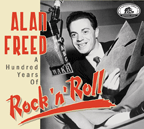 Alan Freed
Alan Freed
A Hundred Years Of Rock ‘N’ Roll
Bear Family Records
The 29 year-old Pied Piper of rock ‘n’ roll, ill-fated deejay Alan Freed, after stints in in Philadelphia and Ohio, migrated to WJW in Cleveland in 1951— where here he was emboldened by local Record Rendezvous retail store owner, Leo Mintz, to broadcast rhythm ‘n’ blues records on a show Freed dubbed Moondog’s Rock ‘n’ Roll Party, saying that he chose the new moniker to avoid the racial onus inherent in current names like “rhythm ‘n’ blues” and “race music.” Rock ‘n’ roll’s ship would probably have sailed without Freed but he was the impetus. Throughout his radio show he would pound out the “big beat” in fours on a telephone book and his jive-grooved fervor, as charismatic as the records he played, engendered enormous listening figures. In September of 1954 he moved to New York where he hosted Rock ‘n’ Roll Party on WINS and by 1957 he was a household name, assembling package shows with a panoply of acts, virtually all black, playing to audiences that were 75% white as well as appearing in three well-received films. Yet, a year later he was made the fall guy for the industry-wide payola scandal. Attempts to resuscitate his career were fruitless and he died, only 43 years old, in a Palm Springs hospital on January 20th, 1965. The trade journal Cashbox commented: “He had suffered the most and was perhaps singled out for alleged wrongs that had become a business way of life for many others.” Rock ‘n’ Roll never had a better friend. This 39 track CD, spanning 1952 to 1959, takes on the character of one of his fabled radio shows as he is involved in nearly all the recordings—from lively air-checks and off-the cuff commercial spots (for everything from beer and used cars to furniture and a model agency) to radio intros and plenty of music—from the likes of Chuck Berry, Little Richard, Johnny Otis, Bo Diddley, Ernie Andrews, the Johnny Burnette Trio and Jesse Belvin, who closes affairs with his classic “Goodnight My Love (Pleasant Dreams).” A fact and image-laden 34 page booklet with an extended essay by Bill Dahl completes this nifty tribute deck.—Gary von Tersch
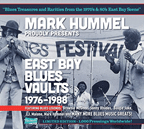 Mark Hummel
Mark Hummel
East Bay Blues Vaults 1976-1988
Electro-Fi Records
Producer and West Coast harp ace Mark Hummel puts it this way in his informative liners: “This 22-track retrospective of East Bay rare cuts and 45 rpm singles is a project that big-eared harp player Bob Corritore first encouraged me to put out as a result of early obscure recordings he’d heard about.” Here Hummel opens the vaults to what is now considered the Golden Age of the East Bay blues scene and the legendary, if mostly overlooked or taken for granted, musicians that both inspired and influenced the youngster from Los Angeles in the 70s and 80s. I should know as I was there also soaking it all in from Oakland and Berkeley to Hayward and Richmond. The result of Hummel’s intensive investigation, this generous and consistently potent 22 tracker, is a real treasure trove of ultra rare recordings (mostly obscure 45’s and heretofore unreleased studio material) from the likes of Brownie McGhee (who opens affairs with a fervent rendition of “Walk On“), guitarist/vocalist Sonny Rhodes (with four nuggets including the autobiographical “Look Out For Sonny Rhodes and a convincing version of St Louis Jimmy’s “Take The Bitter With The Sweet”), guitarist vocalist Boogie Jake (with two ready-steady originals—“Automobile Blues” and “Boogie Train,” that prove a saucy mix of swamp blues & New Orleans funk) and ace slide guitarist Ron Thompson with the tempest-tossed, episodic “Close Call” with both Little Willie Littlefield and Junior Watson joining in on the fun. The party rolls on with four selections showcasing Mississippi Johnny Waters and the Blues Survivors (the Muddy Waters-styled “I Can’t Hang,” “You Can Look For Me,” “I’m Wondering” and the Elmore James-like “Left My Home”) with the Survivors also supporting Mr. Hummel on both “Sugar Sweet” and his healthy original “Gotta Make A Change” (the first Rockinitis 45) as well as on Bob Kelton’s rocking “Grandpa Said” and the galloping “Racetrack Blues.” Also noted are a pair by Parisian guitarists - Paris Slim (Frank Goldwasser) who very ably covers Lowell Fulson’s “Guitar Shuffle and Junior Parker’s magnetic “Stranded.” Further roof-raisers from the likes of BBQ Barners, Cool Papa (who was a true original a la the incredible LC “Good Rockin” Robinson) and J.J. Malone and this reviewer is breathless. More please!—Gary von Tersch
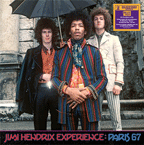 Jimi Hendrix Experience
Jimi Hendrix Experience
Paris 67
Dagger Records LP
This audiophile grade, RSD Black Friday 150 gram red-and-blue-colored vinyl album presents the original Experience (Hendrix, bassist Noel Redding and drummer Mitch Mitchell) in excellent form at the famed Olympia Theater in Paris, France on October 9th, 1967—nearly one year from the date of their 1966 showcase there as a supporting attraction for French pop star Johnny Hallyday. These heavily blues-derived recordings seize the unalloyed verve and exuberant spirit of the unalterably psychedelic moment as Jimi kicks off with a spirited “Stone Free”—familiar to fans as the flip side of his debut single “Hey Joe,” which roaringly follows. A tough-as-nails, slowly simmering “Fire” then leads into the comparatively quiet ballad, “The Wind Cries Mary” as well as the strident “Catfish Blues”— a matchless revamp of Muddy Waters’ classic “Still A Fool” to close side one in feedback-fraught fashion. Side two opens with a blues drenched recall of B.B. King’s classic “Rock Me Baby” as well as a compressed rendition of “Red House” ahead of a bone-crushing, wiry take of the exclamatory “Purple Haze” followed by a dynamic reincarnation of the Troggs’ “Wild Thing,” brimming with a rousingly jocular lead vocal that emphatically and dramatically closes the show. All in all, Hendrix at his bluesiest best.—Gary von Tersch
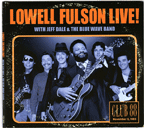 Lowell Fulson
Lowell Fulson
Lowell Fulson Live! with Jeff Dale & the Blue Wave Band
Pro Sho Bidness 2021
Do you know who Lowell Fulson was? You should, and here’s an opportunity. Although born in Oklahoma, this guitarist, singer, and songwriter spent most of his career in the Los Angeles area, and during the 1940s and 1950s he was arguably one of the two top stars of the lively blues scene there, along with Pee Wee Crayton. In addition, Fulson (who was also billed as Fulsom and Fullsom) was a respected bandleader, one of whose bands included upcoming R&B legend Ray Charles and jazz saxophonist Stanley Turrentine. Fulson was active almost until his death in 1999 at age 77.
Southern CA guitarist Jeff Dale and Fulson became friends, and Dale’s band, the Blue Wave, often backed Fulson. One such gig was recorded by Dale, and he rediscovered the tape in 2020 while idled from gigs during the Covid pandemic. The three-quarter hour set is comprised of ten tunes, seven composed by Fulson, who was a prolific and skilled songwriter. (He wrote the widely known “Tramp” and B.B. King’s first hit, “3 O’Clock Blues.”) The set suffers from some of the drawbacks of many live recordings, with a problematic sound mix lacking depth, but nonetheless provides a worthwhile and valuable glimpse of Fulson’s talent. Commencing the recording is a brief instrumental, “Do You Feel It.” Its jangled quality, with dissonance and a ragged three saxophone horn section (including a grandson of Pee Wee Crayton), is a suboptimal introduction to the set, which quickly improves. The ensuing two numbers are shuffles: “You’re Gonna Miss Me” and “Too Many Drivers,” the latter subsequently covered by many performers. “Blue Shadows,” penned by stellar Los Angeles pianist Lloyd Glenn, is introduced by a lyrical guitar solo and demonstrates that Fulson could handle a slow blues adroitly.
Fulson and the band then tackle “Stoop Down Baby,” made famous by its composer, Chick Willis, and I imagine that the dance floor at Club 88 in Los Angeles began to fill. One of Fulson’s tunes which has become a classic, “Reconsider Baby,” follows, with Lowell’s soulful vocalizing overcoming more tonal dissonance with the band. The funky “Do You Feel It,” almost six minutes long, and the slow “Blues Pain” lead into the rocking “Lowell’s Lollipop.” The set ends with the Jimmy Rushing/Count Basie composition “Going to Chicago Blues.”
If you’re looking for polished, sophisticated blues, or impeccable album production values, look elsewhere. If you want to experience the ambience and grit of a 1980s blues club gig featuring a formidable legend, check out this album.—Steve Daniels
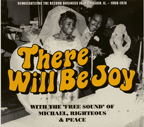 There Will Be Joy
There Will Be Joy
Democratizing The Record Business
In Chicago, IL 1968-1978
NarroWay Records
From the late 60s through the late 70s, Chicago natives Harold Freeman and Rev. Robert Lowe operated their Windy City-based Free Sound Recording Company that was a custom recording venture that served amateur and budding semi-professional gospel artists who were unable to attract the attention of a major label, such as Peacock or Vee Jay, who had fathoms-better promotion and distribution. In doing so, Free Sound not only jump-started the national careers of Rev. Maceo Woods and his Christian Tabernacle Concert Choir, The Cosmopolitan Church of Prayer, Donald Vails’ Choraleers, The Windy City Four and James Conley & Gospel Dimension but in the fact-filled, accompanying CD booklet notes, Grammy-nominated writer Robert Marovich reveals the long-concealed saga of Freeman and Lowes’ enterprise as reflected from interviews with colleagues, gospel singers, musicians and Freeman’s widow. This two CD compilation features an energetic batch of 46 tracks from the founders’ three main labels—Righteous, Michael and Peace. CD One is pretty much split between Righteous and Michael sides highlighted by both sides of The Buffalo Youth and Young Adult Chorus’ sole 45 (a fervent cover of James Cleveland’s “Walk On By Faith” and the traditional “Step Back And Let Me Walk”) along with the falsetto-ridden Gospel Sensationals (“The Holy Bible” and “It’s My Determination”) and the 150-voice strong New Friendship Baptist Church Choir—on the riveting Roberta Martin composition “I Hear God” and “To Be Faithful.” To cite only a few. CD Two, with the sole exception of The Gospel Carolets whose “God Is Sending Out A Warning” on the Davenport label (concerning a tornado that touched down in Chicago‘s South Side in 1967, killing 33) is devoted to the Peace sides. Favorites include a trio of tracks from the Windy City Four (the most senior quartet on this compilation) highlighted by a rumination on the decline of societal mores titled “My How Times Have Changed” as well as the sweet singing Sons Of Christ quartet, who were awarded three tracks as well (the uplifting “Send Me Oh Lord,” “Child’s Prayer” and “Moses (In Egypt Land)“) because of their professional polish that belied their semi-pro status. Also noted are a couple of tracks (“He’s Everything To Me” and “Trying To Get Ready”) by ex-Soul Stirrer lead vocalist Rebert Harris and the Gospel Paraders. Well worth searching out!—Gary von Tersch
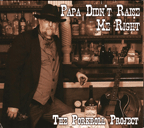 The Porkroll Project
The Porkroll Project
Papa Didn’t Raise Me Right
Roadhouse Redemption Records 2021
Led by guitarist and singer Neal Taylor, The Porkroll Project has been a popular and successful band in the Philadelphia, PA, area for almost two decades. The band released its first album in 2004; this is its fourth, but its first in the last decade. However, during that recording hiatus the band has been busy gigging and has made three appearances at the International Blues Challenge, reaching the semi-finals once.
Here Taylor and harmonica player Buddy Cleveland, who has been a bandmember since 2008, are joined by Walter Runge on keyboards, John Thomas on drums, bassist Anthony Pieruccini, and saxophonist David Renz. They delve into a set of eleven blues and related tunes, comprising a full hour of lively music. Not holding back, the band opens with the title track, one of the nine composed by Taylor. Its vibe is anthemic, and it sports a riveting mid-track guitar solo by Taylor that alternates between bursts of rapid-fire single notes and sustained soaring notes into the high register.
The song is almost six minutes long, and every track of the album lasts over four minutes, signifying that this band likes to dig into a song and establish a groove. “Down in Mexico and “Going to the Station” are a little slower – the former shifts tempo several times – and each gives a hint of Runge’s talent on piano. “Crescent Moon” extends over seven minutes, none of it wasted, and is distinguished by more nice lead guitar by Taylor and some very sweet sax courtesy of Renz.
The ensuing numbers are full of droll humor. “Better You Than Me” tells a tale involving a dog, and cheetah, and a monkey, and “Mama Put the Gun Down” lists a scary/silly collection of weapons that the woman of the house may be tempted to use against the wayward hubby. They are followed by “Dancing with the Angels,” with a rocking gospel aura and some zippy backing vocals by the bandmembers. On this track and the next, “Nothin’ Yet,” Cleveland is allowed some room to exercise the reeds on his harmonica. Humor is again prominent on “The Next Thing Smokin’,” with its unanticipated last verbal phrase.
On “Sentenced to the Blues” Cleveland, who wrote it, delivers understated harp frills in tandem with the guest horns of Andrew Whisler and Chris Neal as Taylor’s tenor vocal proclaims the message. Last but not least, we have “A Taste of Malt Liquor,” a saxophone-prodded track that would certainly have any bar crowd heading for the dance floor.—Steve Daniels
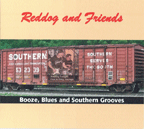 Reddog & Friends
Reddog & Friends
Booze, Blues & Southern Grooves
Survival South Records
A long-time fixture on the Atlanta blues scene in the 1980’s and 1990’s where he was the house band at the largest blues club (Blue Harbor) in Underground Atlanta, Southern-style blues rocker Reddog has lately been based in Pensacola, Florida, where he has been touring throughout the region with his impassioned, rock-solid combo. His latest, eleven track CD features three songs recorded at Johnny Sandlin’s Duck Tape studio in Decauter, Alabama, with the legendary Sandlin behind the glass—the gospel-inflected “Simple Song,” the autobiographically questing “Searching For Some Soul” and a soulful homage to the late, great Eddie Hinton titled “Honest Man.” All the other eight tracks were recorded at East Avalon Recorders in Muscle Shoals with Reddog’s dark-hued vocals and nasty guitar tones, in the tradition of Duane Allman, Freddie King and Otis Rush, highlighted by some deftly quick picking that is matched only by the smoldering intensity of his playing. Picks among the eight include the catchy, mid-tempo opener “Love, You Got To Spread The Word,” the slinky “Back In The Bottle Again,” a moody “The Blues Will Get You Every Time” and the arresting, deep soul ballad “Why, Oh Why, Are You Calling Me.” One of those rare guitarists that make every note count!—Gary von Tersch
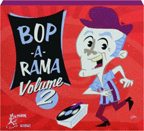
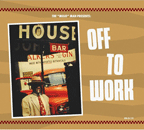 Bop-A-Rama
Bop-A-Rama
Vol. 2
Various Artists
Atomicat Records
Off To Work
Various Artists
Koko Mojo Records
Two more stellar, jam-packed releases from Koko Mojo and its sister label Atomicat. As Dee Jay Mark Armstrong opines regarding Bop-A-Rama: “There are three faithful words that never let you down—Rock, Roll and Rhythm—all baked into the, count ‘em, 30 tracks on offer here. This CD is your bop pill and the music is the cure and with a fancy toe shuffle you can relive your youth with this mixture of several bopping genres—Rockabilly, Rock ‘n’ Roll, Bluegrass and Blues Bop all of which have a perfect dance tempo.” Picks include numbers from well-knowns like Dale Hawkins (“Tornado”), Flatt and Scruggs (“Six White Horses”), Chuck Berry (“Too Much Monkey Business“), Arthur Crudup (“Star Bootlegger”) and Ronnie Hawkins and the Hawks (“Clara”) alongside a few sorta-knowns like the Rock-A-Teens (“Lotta Boppin’“) and Sleepy Labeef’s “Turn Me Loose” with an abundance of talented lesser-known rustic rockers such as Tommy Cassel (“Go Ahead On”), Jack & The Knights (“Rock The Blues Away”), Ben Hall and the Circle 4 Ramblers (“Blue Days—Black Nights”) Jeff Stone (“Everybody Rock”) and Royce Porter—with his hard-driving “Yes I Do,” with fellow rockabilly guitarist Ray Doggett in tow. Off To Work salutes the African-American worker. As essayist Jacqueline Jones puts it in her enclosed essay Black Workers Remember: “It’s one of the great ironies of American labor history that enslaved workers toiled at a wider variety of skilled tasks than did their descendants who were free as slave owners had an economic incentive to exploit the multifaceted talents of blacks in the craft shop as well as in the kitchen and field. But after Emancipation, whites attempted to limit blacks to menial jobs. Well into the 20th century blacks were banned from machine work as well as white-collar clerical and service work.” Focusing on the city of Memphis Tennessee, the 28 tracks collected here offer a story about African-American men and women workers who literally risked their lives and livelihood on the shop floor, day in and day out, trying to provide for their families—beginning with Louis Jordan’s pleading tale “Working Man” and closing with Jay McShann’s low-down “Hard Working Man’s Blues” with room in between for the salient likes of John Lee Hooker (“I Lost My Job Doo Wop”), Jimmy Reed (“Big Boss Man”), B.B. King (“Hard Working Woman”), Esquerita (“Laid Off”), the Heartbeats (“I Found A Job”), Lightnin’ Hopkins (“Don’t Need No Job”) and back-to-back versions of “Blue Monday” by Fats Domino and Smiley Lewis respectively. But where’s the Silhouettes’ “Get A Job,” which was the first up-tempo Doo Wop number to reach #1 on the pop charts?—Gary von Tersch
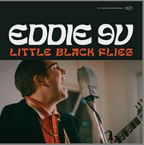 Eddie 9V
Eddie 9V
Little Black Flies
Ruf Records
Eddie 9V is a young man from Atlanta that walks it like he talks it. He’s a son of the South that has that sway and swagger that unabashedly states, “I live and breathe the blues!” As with many projects these days, this album was recorded during the lockdown of 2020 when no one was doing any live gigs to speak of. Eddie and company decided to gather their resources and make themselves useful in the studio. The result is a loose yet focused moment in time where the band captured lightning in a bottle. From the first downbeat to the final bar, Eddie 9V and his crew recreate an authentic vintage sound and prove to be the real deal.
Save for three covers, nine of the dozen tunes here were written by Eddie and his bassist/producer brother Lane Kelly. The title track “Little Black Flies” is a real soul stirrer. Eddie sings with conviction and purpose as he spins a tale of longing for a girl he loves that’s being abused in the apartment above. What a huge voice and sound! He draws you in the room with him. “She Got Some Money” is done in an Elmore James-style, with a tight mid-tempo shuffle and Eddie’s sharp slide guitar work. “Dog Me Around” stays in that shuffle groove but features more frenetic leads and vocals akin to Freddie or Albert King. Jackson Allen’s harmonica playing here is simply sublime. Eddie seems to embody the verve and persona of Buddy Guy on the righteous “Don’t Come Around This House.” It’s a “backdoor man”-type tune that lets it all hang out, with plenty of fire and passion to spare. Albert King’s “Travelin’ Man” is relentless in terms of Eddie’s guitar work and Chad Mason’s keyboards. Stanley Lewis and Sonny Thompson’s salacious “Miss James” finds Eddie quoting the lyrics, “Miss James walking down the street. Looking so good, like a fine piece of meat!” It smolders and builds, with Mason’s piano shining through. “Reach Into Your Heart” shows another side of the band as they work dynamics and real drama into the mix. “Reach into your heart and prove there’s something there tonight,” says Eddie as his scorching guitar and funky accents rattle the amplifier speakers.
There are some other highlights as well, concluding with James Matcher Reed’s epic country shuffle “You Don’t Have to Go.” Eddie clearly counts it off on tape and wraps it at the end stating, “Let’s call it, brother!” That’s kind of the blues equivalent of a mic drop. And Eddie 9V has left the building!—Eric Harabadian
 Dumpster Fire
Dumpster Fire
Mean Old Fireman and the Cruel Engineers
meanoldfireman.com
Dumpster Fire is the second release of the Boston-based Mean Old Fireman and the Cruel Engineers, following 2019’s instrumental album Box 1. The leader of the group, Ned Bollé, spent years as a fireman and ambulance driver, hence the band name. Bollé is an exquisite slide guitarist and singer-songwriter; four of the songs on Dumpster Fire are original compositions by him. Along with Bollé, the band includes Joey Pafumi on drums, John Watkins on keyboards, Marty Phillips on saxes and Dana Andrews on the harmonica while the bass duties are split between Lou Spagnola and Rick Plourde. On the opener “Tour Three,” Bollé tells a true tale about one night working as paramedic intern in Brooklyn. On another track, “Got No Spoons,” Bollé sings from a father’s point of view of his young daughter’s opioid overdose wherein Ned prevented her from dying. Sadly, the father sings Ned “did not save her” he “only kept her alive.” Guest guitarist Toby Soriero plays some nice single note leads followed by Bollé’s sweeping slide work. On “Stack O Lee,” the old blues traditional which tells the story of the murder of Billy Lyons at the hands of “Stag” Lee Shelton, Bollé weaves banjo and mandolin around his dobro to create an authentic backing to the historic story. The band throws a rumba-like rhythm behind the 1966 Robert Parker hit “Barefootin,” also covered by Johnny Winter. The well-known Mose Allison tune “Your Mind is on Vacation” is a treat, as is the cover Ike Turner’s “Rocket 88,” considered by some to be the very first rock and roll song recorded. “McArthur’s Cunning Ruger” is a highlight, telling the true story of bank robber who had the distinction of smearing lemon juice on his face to make himself invisible. The tune features a cool clavinet solo by John Watkins, a taut horn chart and alto solo by Marty Phillips, even a bass (!) solo by Ned Bollé, who expertly matches the compressed studio tone of Little Feat’s Lowell George’s slide guitar throughout the track. Dumpster Fire is a fine collection of interesting songs, all blues-based, and a perfect showcase for Ned Bollé’s exceptional and varied slide guitar chops. —Bob Monteleone
Home
/ Blues Blogs /
Artist Links / Blues
Links / Videos / Store
Subscribe / Advertise
/ Back Issues
/ Contact / Staff